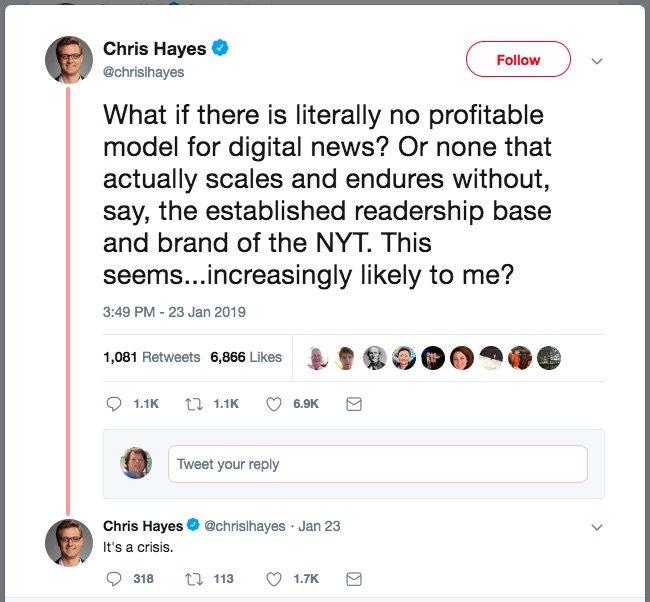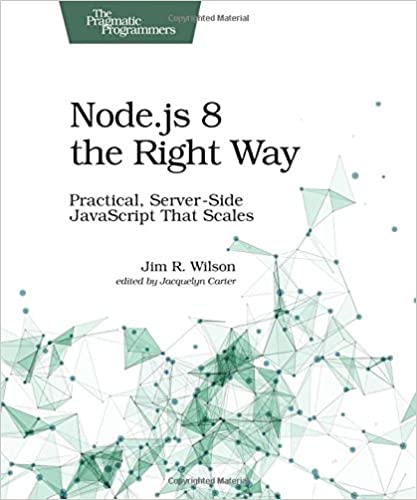; Date: Thu Jan 24 2019
Tags: Online News »»»» Website Business Models »»»» Affiliate marketing »»»»
Chris Hayes, a news presenter at MSNBC, asks a poignant question about whether there is a business model for online "digital news"? That is a troubling question since he is a prominent employee at a well regarded online-only news organization. And it is a crisis, as he says, because with the Internet as it stands we must have valuable high integrity news outlets that are also viable businesses, or we will lose the free and open society we enjoy.

Followup piece: The death of news outlets has been a long time coming - not just business models
In the old days, the news organization business model was to run advertising. The purpose of news outlets was to bring humans, their eyeballs, and their brains, to read or listen to or view the news reports. That served the direct purpose of the news outlet, to inform the public. To keep the news outlet a functioning business, the other purpose of bringing those eyeballs was to also view the advertising. Advertisers paid the money to keep things running, because it was known to drive customers to their businesses.
Today we have zillions of websites all clamoring for attention. Some of them are running high integrity valuable news services, and others not so much. The low quality sites might be shams, just chasing after clickbait rainbows, or producing shoddy work because the lack of income revenue means they can't pay for good quality journalists. Then there are the news parody websites like The Onion (which is incredibly funny), and the outright hoax websites that purport to be news outlets but are publishing lies with the intent to deceive people.
It's difficult to make a go of running an online publishing business if one relies solely on advertising revenue. At least that's my experience from publishing several websites. Advertising revenue (measured in CPM or Cost Per Thousand Impressions) has fallen significantly over the last few years. This means it is an increasingly irrelevant way to earn money with a website, not that it was ever enough.

But, let's get back to a possible business model.
What I've found more lucrative is to enable the sale of specific products.
In my case I've set up pages listing products for sale. The products are related to the topic of the website, and add value to the website because my readers might appreciate the recommended products. The pages are configured so that if someone buys the recommended product, I get paid a commission.
Some example pages are:
- Raspberry Pi board and accessories buying guide.
- Arduino board and accessories buying guide.
- Books and videos so you can easily learn Node.js programming
-
Choosing the best electric car charging stations for home charging or on trips
-
Safely use Extension Cords when charging an electric car or electric motorcycle
In each case I picked a focused topic - whether it is Raspberry Pi computers or electric vehicle charging station equipment - and did my best effort to comprehensively look at the market for these products, and evaluate individual products. In some cases the pages are so well crafted that significant organic traffic arrives from the search engines.
Any website could develop such pages. For example a news site like MSNBC has a wide range of contributors and guests, many of whom have written books. MSNBC could then list a catalog of books (or other products) created by their contributors or guest or staff. A blogger focused on a topic like Homeopathy could have a page listing books about homeopathy.
A similar idea is for the site owner to create their own products. For example here on TechSparx I have quite a few tutorial sections on different topics like Node.js programming, and surely I could use those tutorials in a book on Node.js programming. If you look in the sidebar, I have written a book on Node.js programming for Packt Publishing, and have it linked in the sidebar so someone can buy the book.
Bottom line is I think Chris Hayes - as smart as he is - is being short-sighted about the business model. He seems stuck in thinking the only model is to run advertising. What if the earnable revenue from online advertising will never be enough? What if there is more value to be gained from other kinds of products?
I say this thinking that the available surface area for online advertising dollars is the sum of all web pages on all websites. That is, any website owner can sign up with Google Adsense or other advertising programs. Once they do, their website is added to the pool of available advertising outlets. By itself that is potentially great for the owner of that website, but it means the total pool where advertising can land has increased, and therefore the pool of advertising dollars is diluted.
Am I stuck in a zero-sum-game-delusion? Not exactly. There is a limited set of advertisers, and the total potential advertising budget is the sum of the budget of all advertisers. Therefore each added website dilutes the advertising dollars pool over the added site.
By making affiliate sales arrangements a website can earn revenue from a pool other than advertising budgets. The potential revenue pool that is affiliate sales is of a very different nature. Affiliate sales commissions are sliced out of vendor sales and is therefore directly related to sales volume. This means the pool grows as sales volume grows, and is therefore not limited by the advertiser budgets.











